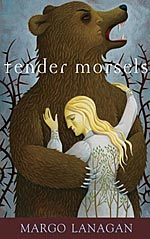
![]() verkisto
verkisto
7/26/2016
![]()
Whenever I go on vacation, I like to hit at least one local bookstore and buy something, just to support them. Tender Morsels was a book I bought at a bookstore that specialized in childrens' literature, namely because the premise sounded intriguing, and I expected a nice, breezy, entertaining read of an alternate take on a fairy tale. I was a little shocked to discover that the opening scene involved two characters enjoying a romp in a haystack, followed by a lengthy scene where a young woman suffered a painful miscarriage orchestrated by her father, who was the one who had gotten her pregnant. It wasn't inappropriate (it was actually pretty crucial to the overall story to have these two scenes), but it just wasn't quite what I was expecting from a YA book purchased from a childrens' bookstore.
The book isn't an easy read. It's by turns beautiful and horrifying, tender and brutal, gentle and violent. It feels like a very important book as you're reading it, but it won't be a book that begs you to finish it in one day. The number of characters and the various experiences they endure demand that you take it slowly and drink in all the details. It took me a little over a month to read it, partly because I was taking my time with the language (I learned that the author began her career as a poet, but I had already guessed that just by reading her prose), and partly because it wasn't a comforable, comforting read. It had its moments of joy and beauty, but it was all filtered through the lens of the main character living in a world of her own making, her own personal heaven.
Liga, the main character, the one I mentioned above who was raped by her father and suffered through two forced miscarriages (the first of which happened when she was so young that she didn't even understand what was happening to her), endures so much emotional and physical pain that she's granted a wish to live in her own personal heaven where she doesn't have to worry about things like her lust-driven father, gangs of roaming rapists, or an indifferent township. Her place is one of magic and wonder, with some infrequent encounters with the real world which exists just on the fringe of her world. So even when those encounters are joyful, she still has to look at it from the perspective that none of it is real. And somewhere in the back of her mind, Liga realizes this, but never seems to build up the strength or the confidence to face the reality of her unreality.
The novel apparently went through a bout of controversy due to its content and its age classification, but it smacks with a sense of importance. It's very well written, and leaves you with a lot to consider. It encourages you to think without beating you over the head with its theme, and it's very much a book written from a feminist perspective. I understand why it was classified as a YA novel (the ages of the protagonists fall within that age range, and the lessons of the novel are relevant to that crowd), but I also understand why it received the controversy it did. I think this would be a good novel for young women to read, but at the same time, I would recommend that parents read this book with their daughters so that they could discuss the events as they happen in the book. Beyond that, I would recommend it to anyone looking for a well-written, thought-provoking retelling of a classic fairy tale. It won't be easy, but it will certainly be rewarding.